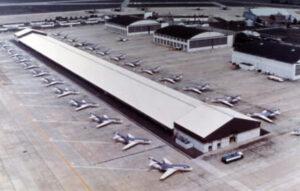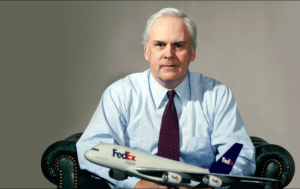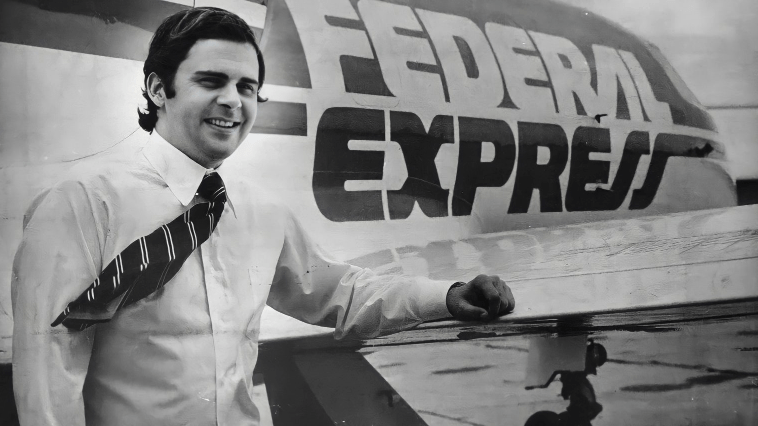In the world of logistics and package delivery, one name stands out as a true pioneer and visionary: Frederick Smith, the founder of Federal Express. With his revolutionary ideas and relentless determination, Smith transformed the way goods are transported and laid the foundation for one of the most successful and iconic companies in the world. This article delves into the life and achievements of Frederick Smith, highlighting his impact on the logistics industry and the enduring legacy of Federal Express.
Frederick Wallace Smith was born on August 11, 1944, in Marks, Mississippi. Growing up in a family involved in the transportation industry, Smith was exposed to the challenges and complexities of moving goods from an early age. His father owned a small freight-forwarding company, which sparked young Smith’s interest in the logistics world. Little did anyone know that this upbringing would lay the groundwork for a groundbreaking revolution in package delivery.
After completing his education at Yale University, where he wrote a groundbreaking paper on overnight package delivery, Smith enlisted in the Marine Corps and served two tours in Vietnam. His military experience not only honed his leadership skills but also reinforced his belief in the importance of logistics and efficient supply chains.
 In 1971, armed with a clear vision and innovative ideas, Smith founded Federal Express (now known as FedEx). His concept was simple yet revolutionary: to provide reliable, overnight delivery service for packages and documents. At a time when the logistics industry was dominated by slower, less efficient methods, Smith’s ambitious goal seemed audacious, if not impossible. Nevertheless, he remained undeterred and pushed forward with his plans.
In 1971, armed with a clear vision and innovative ideas, Smith founded Federal Express (now known as FedEx). His concept was simple yet revolutionary: to provide reliable, overnight delivery service for packages and documents. At a time when the logistics industry was dominated by slower, less efficient methods, Smith’s ambitious goal seemed audacious, if not impossible. Nevertheless, he remained undeterred and pushed forward with his plans.
To turn his vision into reality, Smith faced numerous challenges, from securing initial funding to building a dedicated team of professionals who shared his passion and determination. He poured his own savings and borrowed heavily to launch the company, a risky move that highlighted his unwavering belief in his ideas. With a startup capital of $4 million, Federal Express took flight.
One of the most critical aspects of Smith’s strategy was the integration of technology into the delivery process. Recognizing the potential of computer systems to streamline operations and track packages in real-time, Smith implemented a sophisticated computer network that became the backbone of FedEx’s operations. This innovative system, known as COSMOS (Customers, Operations, and Services Master Online System), allowed for seamless communication and efficient management of the entire delivery process.
Smith’s emphasis on employee training and development played a significant role in FedEx’s success. He recognized that the company’s success hinged on the commitment and dedication of its workforce. By creating a culture that fostered employee growth, encouraged teamwork, and rewarded exceptional performance, Smith built a highly motivated and efficient team of employees who became the driving force behind FedEx’s exceptional customer service.
In 1973, just two years after its founding, Federal Express began operations, and Smith’s vision started to take shape. The company faced initial struggles and financial setbacks, but Smith remained resolute, introducing innovative concepts like the “hub and spoke” system. This system involved utilizing a centralized hub, where packages from various locations would be sorted and then distributed to their destinations, drastically reducing transit times and improving efficiency. This groundbreaking approach revolutionized the logistics industry and became one of FedEx’s defining features.
The turning point for FedEx came in 1977 when the company faced a severe financial crisis, with mounting debts and a looming bankruptcy. In a bold move, Smith decided to take the company public, which injected much-needed capital and saved FedEx from imminent collapse. The IPO not only secured the company’s future but also marked the beginning of an extraordinary growth trajectory.
Under Smith’s visionary leadership, FedEx expanded its services to include international shipping, creating an extensive global network. The company pioneered the concept of overnight international delivery, connecting businesses and consumers across borders in record time. This expansion cemented FedEx’s position as a market leader and propelled its growth on a global scale.
 Frederick Smith’s entrepreneurial spirit and innovative approach earned him numerous accolades and recognition throughout his career. In 2000, he was inducted into the National Aviation Hall of Fame, and in 2014, he received the Tony Jannus Award for his significant contributions to commercial aviation. Smith’s impact extended beyond the logistics industry, as he actively participated in public affairs, serving as a member of various prestigious boards and advising policymakers on economic matters.
Frederick Smith’s entrepreneurial spirit and innovative approach earned him numerous accolades and recognition throughout his career. In 2000, he was inducted into the National Aviation Hall of Fame, and in 2014, he received the Tony Jannus Award for his significant contributions to commercial aviation. Smith’s impact extended beyond the logistics industry, as he actively participated in public affairs, serving as a member of various prestigious boards and advising policymakers on economic matters.
Today, Federal Express, now commonly known as FedEx, stands as a testament to Frederick Smith’s enduring legacy. The company operates in over 220 countries and territories, employing hundreds of thousands of people worldwide. Its iconic logo, recognizable delivery trucks, and commitment to exceptional service have made FedEx a household name synonymous with reliability and efficiency.
Frederick Smith’s audacity, perseverance, and innovative thinking continue to inspire entrepreneurs and industry leaders globally. His remarkable journey, from a small-town boy with a dream to the founder of a global logistics giant, exemplifies the power of visionary leadership and the impact of disruptive ideas. Through his unwavering commitment to excellence, Frederick Smith transformed the logistics industry and forever changed the way goods are delivered around the world.

